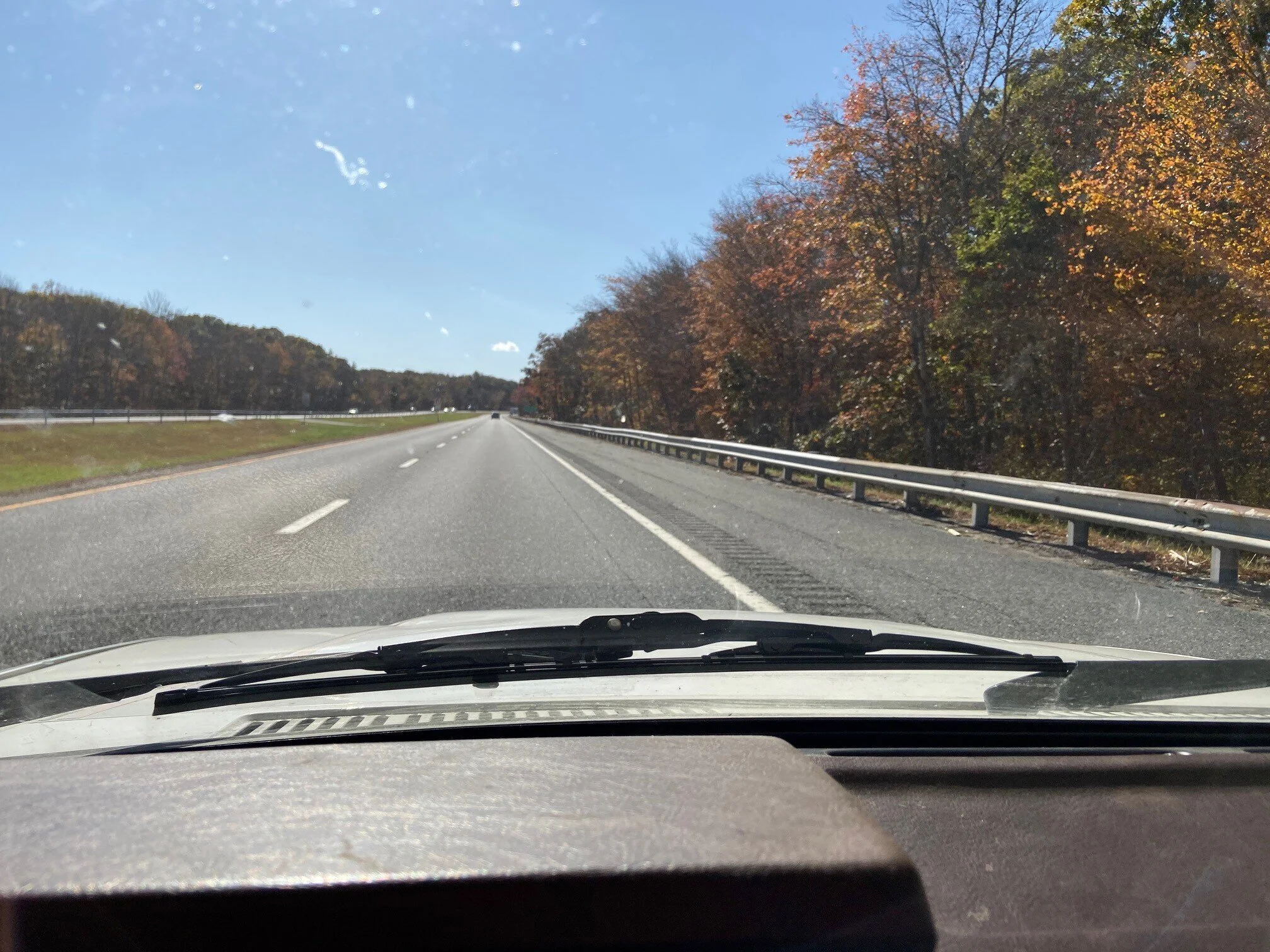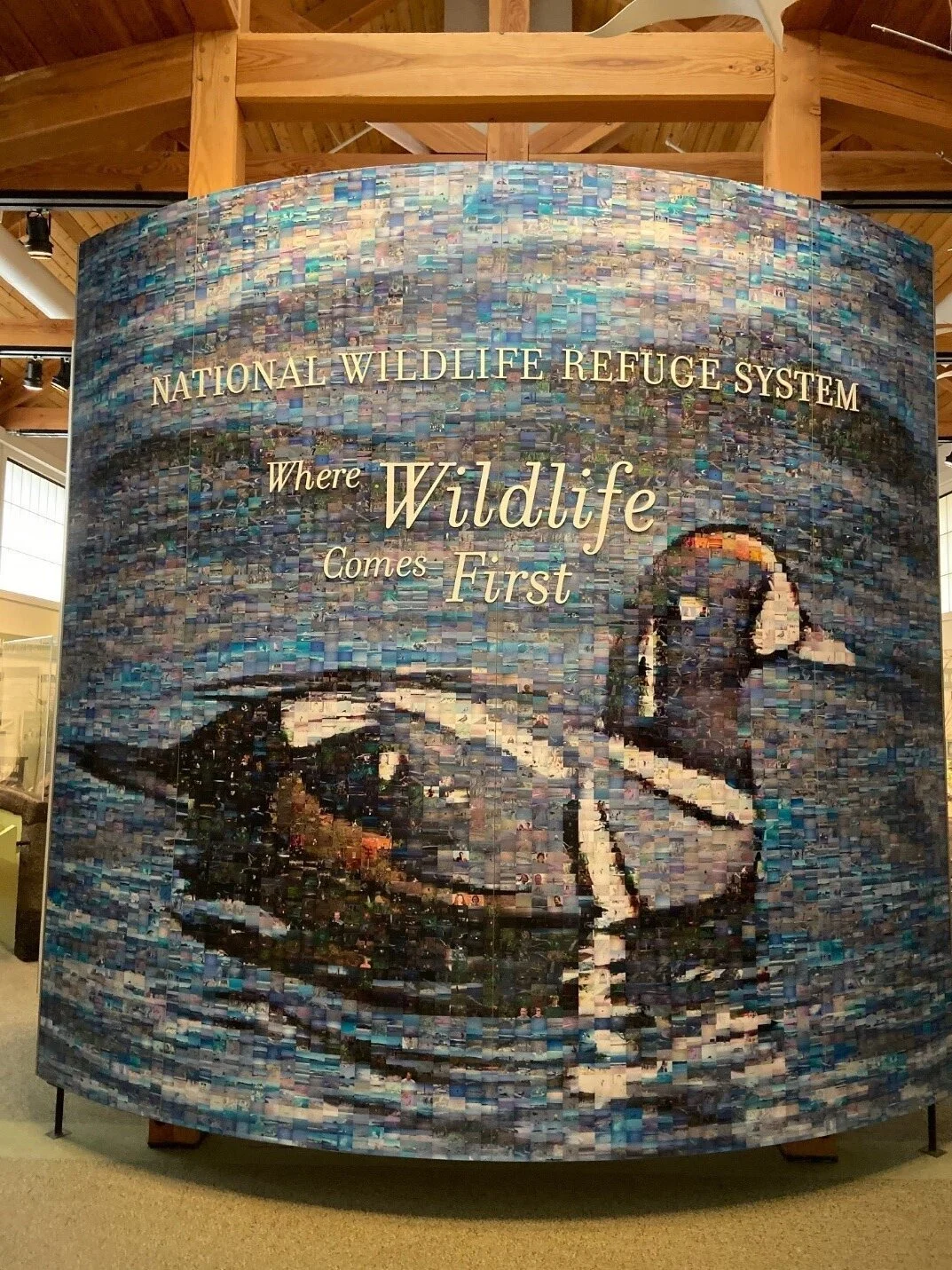Overlooking the Ocean in Rhode Island
This column is brought to you by FEDS Protection, provider
of federal employee professional liability insurance.
Huey and I continued our tour of New England in the state of Rhode Island. Because I have family all over the area, I had previously visited five of the six New England states. I felt a spark of excitement as we entered Rhode Island, the lone wholly unfamiliar state. Huey, who, as his many escapes suggest, has a distaste for borders of any kind, remained asleep in the passenger seat.
We were headed for Newport, Rhode Island. I managed to snap one picture of the changing leaves as we drove along a quiet stretch of highway. Huey is usually a model passenger, but I do wish that he could take photographs of the scenery while I drive. We crossed several bridges with expansive views of the waterways that I could not safely stop to capture.
Driving into Rhode Island.
Our mission in Newport was to speak with Kate Masury, the Program Director of an organization called Eating with the Ecosystem. Eating with the Ecosystem is a nonprofit focused on promoting ecosystem-based fisheries management through research, education, and outreach. The traditional approach to fisheries management focuses on single species. An ecosystem-based approach takes into account multiple species, the environment, and the community at large to create more sustainable model of fisheries management. Eating with the Ecosystem works with marine scientists, commercial fisherman, and local chefs to engage with seafood consumers.
Eating with the Ecosystem recently completed the Eat Like a Fish Project, a collaboration with the University of Rhode Island that received a Saltonstall-Kennedy Grant from the National Oceanic and Atmospheric Administration (NOAA). With the help of 86 citizen scientists, the project tracked the availability and diversity of local seafood in New England marketplaces.
Eating with the Ecosystem also recently received a grant from NOAA’s Coastal and Ocean Climate Applications (COCA) program to study how seafood markets will be affected by climate change. The project will include interviews with seafood suppliers, restaurant experiments, and consumer surveys. The results of the project will help guide the seafood business as it adapts to different species availability due to a changing climate. Using federal funding, partnerships with academia, and the power of citizen scientists, Eating with the Ecosystem is contributing to a stable seafood future for New England.
The coast in Narraganset, full of life under the surface.
Huey and I spent a weekend in Narraganset as a waypoint between official stops. While there, we celebrated the two-year anniversary of when I adopted Huey. He came to the Humane Rescue Alliance, the D.C. shelter, as part of an effort to relocate Puerto Rican dogs after Hurricane Maria in 2017. He had a host of health problems, but as soon as I saw him, I knew that I would be taking him home. Two years later, he is a happy and healthy pup. We spent our adoptiversary walking along the seawall in Narraganset. Huey met many people and even got a cookie from a passing stranger. His exuberance when he walks makes people stop to smile at him, give him pats, and tell him he’s a handsome boy.
On our way out of Narraganset, we swung by the Point Judith Lighthouse, which resides in the Coast Guard’s Station Point Judith. As the lighthouse is within the secure facility, we took pictures from outside the fence. There were many vehicles in the facility lot, evidence of the active Coast Guard presence. It was a blustery and rather grey day on the coast, so we forged on.
Huey surveys Station Point Judith, paws firmly planted so he doesn't blow away.
We drove south along Route 1 and took an impromptu stop at the Kettle Pond Visitor Center in the Ninigret National Wildlife Refuge. The U.S. Fish and Wildlife Service maintains refuges all across the country, including multiple in Rhode Island. Huey and I took a rather damp hike along a dog-friendly trail and then I went into the visitor center alone. A gregarious volunteer greeted me introduced me to the exhibits and information available to visitors. I perused the various dioramas and activities highlighting the species in the refuge and explaining the importance of preservation. There are five National Wildlife Refuges in the state of Rhode Island alone.
The entrance to the exhibits at the Kettle Pond Visitor Center.
We likely won’t visit other National Wildlife Refuges during our journey, although they are numerous. Unlike national parks or historically preserved locations, the wildlife refuges primarily exist for the benefit of the wildlife, not to cater to human (or canine) visitors. Many refuges have walking trails for people to enjoy, but most, understandably, do not allow dogs. The plentitude of federal locations that encourage human visitation enable us to leave the wildlife undisturbed.
Although Rhode Island is a small state, the federal presence there seems dense. Over the course of our drive through the state, we passed many signs noting the presence of the Fish and Wildlife Service, the Coast Guard, and other federal entities. Huey, who always seems energized by the ocean, appreciated the many miles of shoreline in the state. We were ready to continue our journey into Connecticut to complete our exploration of federal influence in New England.
Huey looks to the future (or probably just for squirrels).
Stay tuned! You can follow our journey in this column and by checking out our Huey-centric Instagram page @federalfifty. Please send us any comments or suggestions for future stops here.
FEDS Protection is a Proud Sponsor of The Federal Fifty Journey.
To All the Federal Employees in All Fifty States – We Thank You for Your Service.
FEDS Protection has your back so you can perform your mission with peace of mind.
Go ahead, ask around. We have a reputation for doing right by federal employees.
fedsprotection.com
You Simply Can’t Afford NOT to Have It!







